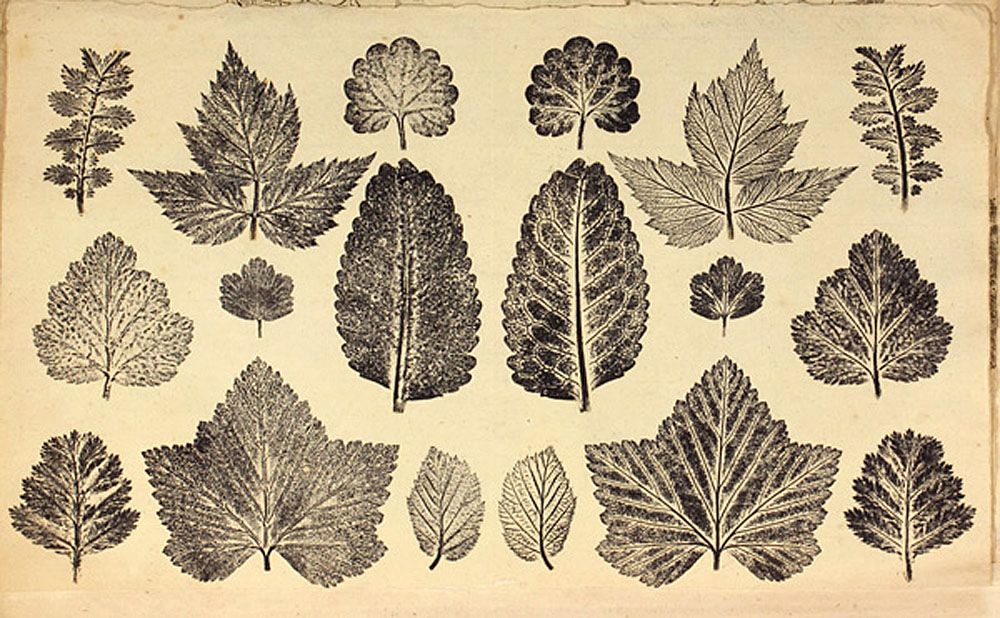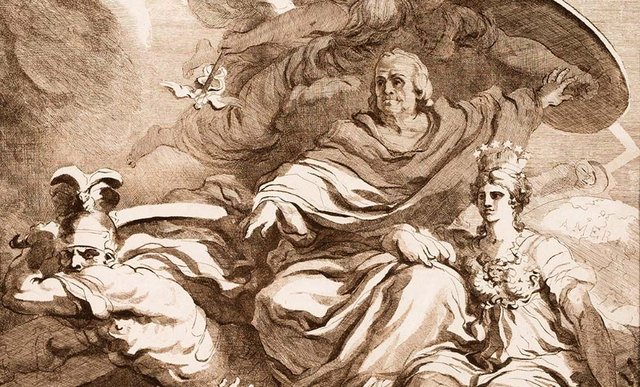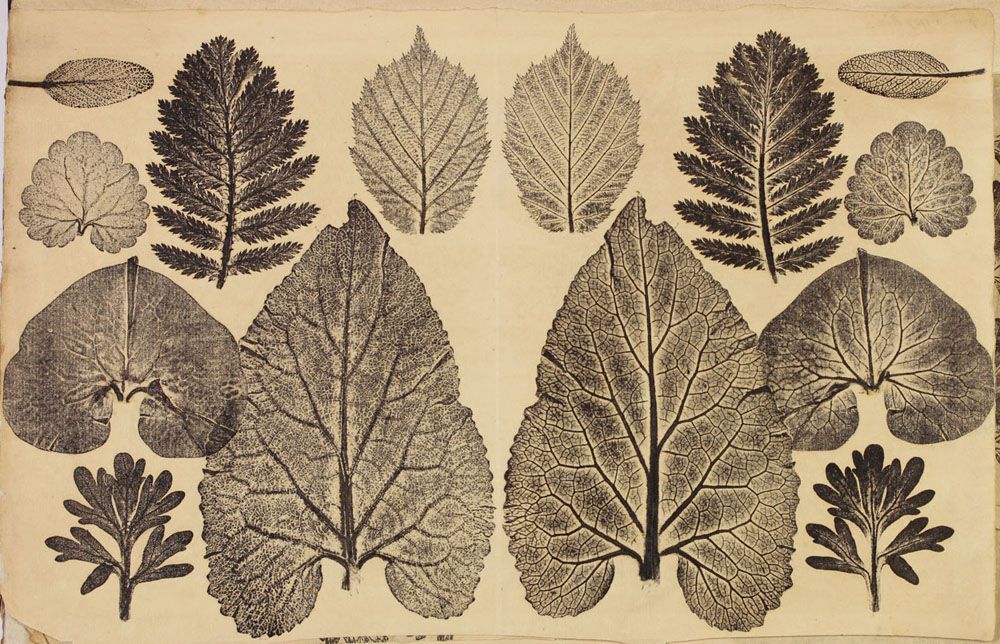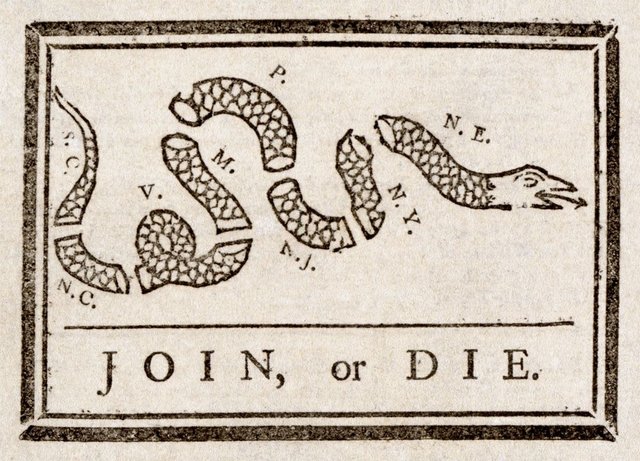An 18th-century leaf-printing project as it relates to counterfeit-resistant currency, discussed here by @voronoi, features the printer’s partner, the go-to Founding Father: Benjamin Franklin.

It’s a story well worth telling. But a deeper look into the life and work of the leaf printer, Joseph Breintnall, sans Ben, is worthwhile in and of itself. Breintnall’s legacy has long been marginalized by scholars, who, time and time again, have been like moths diverted by the bright lights of genius and fame.
After all, Franklin tamed lightening (he invented and shared the lightening rod) and, with the help of others, won independence from a great and powerful nation. “Eripuit coelo fulmen, sceptrumque tyrannis”—“He snatched the thunder from the skies and the scepter from tyrants”—was inscribed on a depiction of Franklin as a classical, God-like hero—during his own lifetime.

Breintnall’s accomplishments, no matter how exceptional, wouldn’t hold a candle.
Plus, Brientnall’s ignominious demise—his naked body was found washed up on the banks of the Delaware River in March 1746—was full of uncertainty, even suspicion. Fellow Quaker John Smith cattily speculated Breintnall’s cause of death was suicide. He wrote of Breintnall’s lack of faith, adding when “Religion is banished…I know not what Can Relieve A Man in deep distress, but death, & the mean, Low hope of Annihilation therein.”
There would be no public shedding of tears for Breintnall.
His widow hosted the directors of the Library Company of Philadelphia, the group Breintnall had served as its secretary since its founding in 1731, and presented them with her husband’s manuscripts on meteorology and horticulture “with a large Collection of Prints of Leaves of Plants growing near Philadelphia.”
Franklin took over Breintnall’s job of secretary, just as he had taken over the practical application of leaf printing for creating a new line of currency. Later, Franklin would recognize Breintnall in his autobiography as “a copyer of deeds for the scriveners, a good natur'd, friendly, middleag'd man, a great lover of poetry, reading all he could meet with, and writing some that was tolerable; very ingenious in many little Nicknackeries, and of sensible conversation.” A rare and generous shoutout by a Founding Father, whose own life would be recounted again and again in scores of biographies.
But there would be no biography for Breintnall.

Born in the last decade of the 17th century in Philadelphia, a decade before Franklin's birth in Boston, Breintnall was many things: scrivener, journalist, merchant, sheriff, Junto member and founder of the Library Company. Exploring his journalism, his poetry and his 300 leaf prints, we feel the presence of a major figure in an early American cultural community.
Breintnall as Phantom
Yet, historians who have encountered Breintall’s writings and his unique and massive collection of leaf prints—a creative project of unprecedented skill and scale in colonial America—conclude: Breintnall deserves more attention. David Shields, called him “a phantom of colonial literary history.” Christoph Irmscher, went so far as to identify Breintnall as “an unjustly neglected figure in colonial intellectual history.”
If studied deeply and thoroughly, Breintnall’s written and graphic legacy would be a rich, graphic lens for early American creativity and culture.
Rattlesnake Tales
Of the many curious highlights that a deep dive into all things Breintnall would offer up, we point out perhaps the most curious of all: he believed the rattlesnake had special powers. They would charm and paralyze prey when locked in their gaze. Breintnall, and a few others, believed that humans were also susceptible of serpent-induced spells.
In May 1745, after being bitten by a rattlesnake, Breintnall wrote a letter subsequently published by the Royal Society, London. In detail, he described the horrific effects of the bite of this uniquely American snake: “…the most surprising and tormenting were my dreams… now if I slept, so sure I dreamed of horrid places, on earth only; and very often rolling among old logs. Sometimes I was a white oak cut in pieces; and frequently my feet would be growing into two hickories [sic]. This cast a sort of damp on my waking thoughts…”.
Breintnall believed that the symptoms of the “horrid poison” would return at the first anniversary of the unfortunate bite. Perhaps his death, about a month before that time, was self-inflicted?

Franklin knew better than to join in on superstitious matters. As was always his style, he made the most of whatever he encountered. So far as the rattlesnake was concerned, Franklin appropriated the image for one of the most powerful political images ever: his Join, or Die cartoon, first published in his newspaper, The Pennsylvania Gazette, on May 9, 1754.
In this case, Franklin turned lemons into lemonade.
The man who artists depicted in a toga, the man who just couldn’t help himself from constantly improving, inventing and innovating, always got—and still commands—the spotlight.
Want to learn more about Breintnall and the story behind Franklin's paper money? Watch this 4:25 minute video by Articulate featuring yours truly:

When life gives you lemons make lemonade.
Downvoting a post can decrease pending rewards and make it less visible. Common reasons:
Submit
Nice post
Downvoting a post can decrease pending rewards and make it less visible. Common reasons:
Submit
This Breintnall guy was such an interesting character, I remember you mentioning the rattlesnake powers but has no idea he died in such a terrible way.
Those philly rattlers have a way of sneaking up on ya! Thanks for sharing this @kenfinkel
Downvoting a post can decrease pending rewards and make it less visible. Common reasons:
Submit
His rattlesnake letters would make a great post. I really wonder what Breintnall might have accomplished had he lived into the second half of the 18th century. (That’s where the action was...)
Downvoting a post can decrease pending rewards and make it less visible. Common reasons:
Submit
Congratulations @kenfinkel! You have completed some achievement on Steemit and have been rewarded with new badge(s) :
Click on any badge to view your own Board of Honor on SteemitBoard.
For more information about SteemitBoard, click here
If you no longer want to receive notifications, reply to this comment with the word
STOPDownvoting a post can decrease pending rewards and make it less visible. Common reasons:
Submit